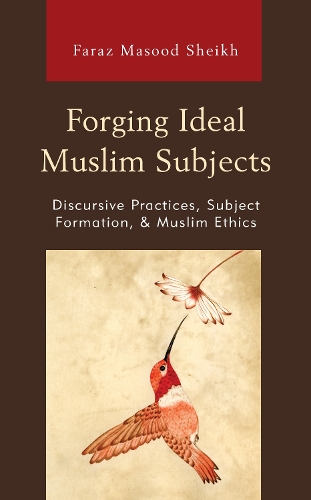
Forging Ideal Muslim Subjects: Discursive Practices, Subject Formation, & Muslim Ethics
(Hardback)
Available Formats
Publishing Details
Forging Ideal Muslim Subjects: Discursive Practices, Subject Formation, & Muslim Ethics
By (Author) Faraz Masood Sheikh
Bloomsbury Publishing PLC
Lexington Books
22nd July 2020
United States
Classifications
Professional and Scholarly
Non Fiction
Theology
297.5
Physical Properties
Hardback
198
Width 161mm, Height 240mm, Spine 21mm
476g
Description
There are many ways of living religiously informed ethical Muslim lives In this book, the author presents two important accounts, one by the 9th century moral pedagogue, al-Harith al-Muhasibi (d. 857) and the other by 20th century Kurdish Quran scholar, Said Nursi (d. 1960), of what the psychic states and moral subjectivity of an authentic, ideal Muslim ought to look like in everyday life. The book analyzes their accounts of the nature of and the discursive practices implicated in the self-production, of what the author calls ideal Muslim subjects. The book draws on Foucault's insights about ethics and the practices of self-care, to examine Muslim discourses in a way that enriches contemporary discussions about identity, individuality, community, authority, agency and virtue in the fields of religious ethics, Islamic studies and Islamic ethics. The author deepens our understanding of the fluidity and fragility of both the more familiar obligation-centered ethics in Islam and the less familiar, belief-centered mode of Muslim ethical life.
Reviews
Living in the modern world demands subservience to the gods of materialism, tribalism, and efficiency. How may one escape this iron cage Faraz Sheikh investigates the writings of al-Harith al-Muhasibi and Said Nursi to find out and discovers that these two thinkers have plenty to say. Both thinkers drew exquisitely detailed portraits of the ideal subjectivity and wrote incisively about how one may fashion it. This beautifully written book is an exemplary constructive and conceptual contribution to the field of religious ethics that puts Islamic thought in dialogue with ethicists concerned with secularism, pluralism, and the place of religion in the modern world.
Sheikh's work includes a dissertation on ninth-century Arab Muslim thinker and moral teacher al-Harith, born Asad al-Muhasibi. Sheikh (William and Mary) has also presented at conferences and written journal articles--evidence of his significant scholarship in religious ethics. In the present book, Sheikh applies what is appropriately termed a "third wave" interpretation in comparative religious ethics. He adds to his previous writings by integrating a close reading of 20th-century Kurdish Muslim Qur'anic scholar Said Nursi (1878-1960) with work of French philosopher Pierre Hadot and with late-career, post-Iranian revolution writings of Michel Foucault. The introduction, "Narrating Ideal Muslim Subjectivities in a Foucauldian Register," provides a succinct orientation to the project. Four substantive chapters--two on Muhasibi and two on Nursi--bring received Muslim categories into a more general discussion that includes the formation of moral subjectivity, sincerity, and self-care practice central to the work of Hadot and Foucault. The result is a serious, consequential analysis that can show new ways to appreciate long-established practices and methods for Muslim moral formation. Extensive references, bibliography, and index. Summing Up: Recommended. Upper-division undergraduates through faculty.
Textually layered, theoretically vivacious, and historically grounded, Forging Ideal Muslim Subjects marks a major intervention in the study of Muslim ethics and moral philosophy. How have Muslim thinkers wrestled with the foundational question of what constitutes a normatively good life and subjectivity Faraz Sheikh examines this question, combining brilliance with deep reflection, through an unprecedented exploration of the religious thought and career of two major though less explored scholars from the 9th and 20th centuries: al-Harith al-Muhasibi (d.856) and Said Nursi (d.1960). Faraz successfully demonstrates that while distinctive and separated by many centuries, these thinkers present us with particularly effective examples of the enduring yet variegated significance of moral discipline and subjectivity in Muslim thought and practice. This book should and will be widely read and debated.
Author Bio
Faraz Masood Sheikh is assistant professor of religious ethics in the Department of Religious Studies at William & Mary.
